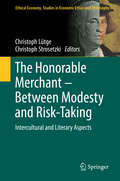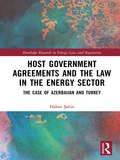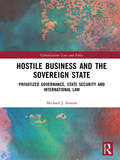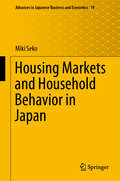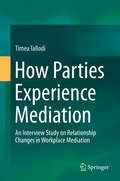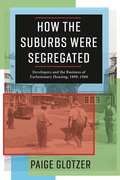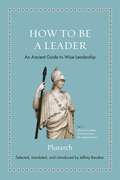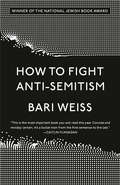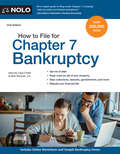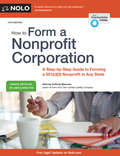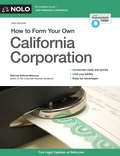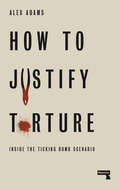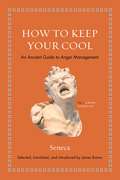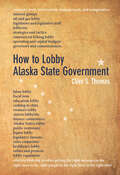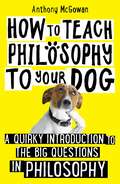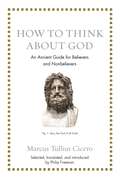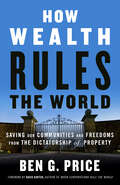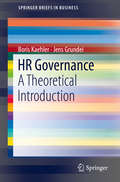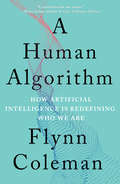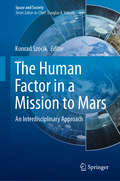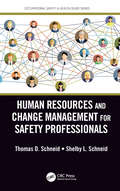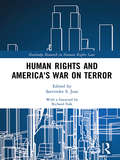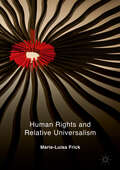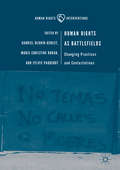- Table View
- List View
The Honorable Merchant – Between Modesty and Risk-Taking: Intercultural and Literary Aspects (Ethical Economy #56)
by Christoph Lütge Christoph StrosetzkiThis volume explores the concept of the honest merchant, taking a broad perspective and covering a wide range of aspects. It looks at the different types of “honest merchant” conceptions originating from different cultures and literary traditions. The book covers Japanese, Islamic, Scandinavian, Russian, German, Spanish, as well as other aspects, and studies different disciplinary backgrounds of the honest merchant, such as philosophical, economic, neuroethical, sociological and literary ones.The concept of the honest merchant has a long tradition in business ethics. In the Hanseatic League and in medieval Italy, the ideal of the honest businessman was taught since the late Middle Ages. It originated during a time when travelling merchants were often regarded with a sceptical eye. The honest merchants of their time however held clear principles in their business and took responsibility for their community. In later times, the religious notions of the concept lost their pivotal place to reason and morality. This book goes beyond the tradition of discussing business ethics in association with concepts from the Hanseatic League and medieval Italy, and puts the central concept of business ethics in a much greater perspective.
Host Government Agreements and the Law in the Energy Sector: The case of Azerbaijan and Turkey (Routledge Research in Energy Law and Regulation)
by Hakan SahinThe energy industry is a key source of growth stimulation for developing states. Understandably, developing states are eager to enter into petroleum investment contracts with international investors, with the expectation that this will benefit their countries. The domestic law of some developing states provides a welcoming investment environment in the form of guarantees and stability, while other states provide these opportunities by agreeing to investment contracts or treaties drafted by international organisations established to facilitate such agreements. <P><P>This book identifies the political risks, particularly of indirect expropriation, that arise from the unilateral actions of host governments during the lifespan of energy investment projects. Focusing on stabilisation clauses as a political risk management tool, this research-based study draws on comparative empirical evidence from Turkey and Azerbaijan to determine what influences host states to consent to the insertion of stabilisation clauses in long-term host government agreements. Proposing a framework for the role to be played by both internal forces and external forces, it examines political regimes and state guarantees to foreign investors in Azerbaijan and Turkey from a comparative perspective, assessing how effective internal factors in Azerbaijan and Turkey are in facilitating contractual stability in their energy investment projects. <P><P>Providing a comprehensive analysis of stabilisation clauses and the internal and external factors that compel host states to commit to them, this book will appeal to practitioners, students and scholars in international investment law and energy law.
Hostile Business and the Sovereign State: Privatized Governance, State Security and International Law (Globalization: Law and Policy)
by Michael J. StraussThis book describes and assesses an emerging threat to states’ territorial control and sovereignty: the hostile control of companies that carry out privatized aspects of sovereign authority. The threat arises from the massive worldwide shift of state activities to the private sector since the late 1970s in conjunction with two other modern trends – the globalization of business and the liberalization of international capital flows. The work introduces three new concepts: firstly, the rise of companies that handle privatized activities, and the associated advent of "post-government companies" that make such activities their core business. Control of them may reside with individual investors, other companies or investment funds, or it may reside with other states through state-owned enterprises or sovereign wealth funds. Secondly, "imperfect privatizations:" when a state privatizes an activity to another state’s public sector. The book identifies cases where this is happening. It also elaborates on how ownership and influence of companies that perform privatized functions may not be transparent, and can pass to inherently hostile actors, including criminal or terrorist organizations. Thirdly, "belligerent companies," whose conduct is hostile to those of states where they are active. The book concludes by assessing the adequacy of existing legal and regulatory regimes and how relevant norms may evolve.
Household Energy Consumption in China: 2016 Report
by Xinye Zheng Chu WeiThis book is primarily based on data from the third analysis of domestic energy consumption, and it combines the conclusive summarizes from the previous two investigations. The book sets out to extend the spatial dimension of the research to a global one and discusses future development of domestic energy consumption from a global perspective. Additionally, the book seeks to discover general rules and diversity features via comparison, domestic vs. global. Future predictions via observations and summaries of history are provided for the reader in this volume as well. The studies in this volume not only provide a basic and supportive index for academic research, but also provide readers with a concrete sketch for people to understand energy use in their day-to-day lives, and it provides policy makers with fundamental, need-to-know data.
Housing Markets and Household Behavior in Japan (Advances in Japanese Business and Economics #19)
by Miki SekoThis book addresses essential questions about housing by building theoretical models based on various real world problems in Japan and testing these models using econometric methods. Almost all related empirical analyses use Japanese household longitudinal data. Accordingly, the author analyzes whole aspects of the data, based on an understanding of the actual situation, theory, and empirical analysis, to directly derive a vision of a future housing policy. Why are houses expensive and difficult to obtain in Japan? Why do people have to live in small houses? Why do people not relocate frequently? Why is the earthquake insurance subscription rate so low, particularly in an earthquake-prone country such as Japan, even after such a catastrophic event as the Great East Japan Earthquake of 2011? How do existing housing finance and tax policies or laws relate to these real world problems? To answer these questions, the book clarifies the unique criteria that characterize housing problems in Japan and presents a vision of future housing policy. The short answer is that existing housing finance policy that adopts criteria based on the floor space of houses creates incentives for people to live in even smaller houses. Furthermore, the Japan Rental Act, which affects people renting homes, reduces residential mobility. The incidence of underinsurance against earthquake risk is a result of earthquake insurance market imperfections such as crude and rough geographical risk ratings. The book elaborates on these factors in four parts and will be of interest to all readers who are concerned with the housing market and household behavior in Japan.
How Parties Experience Mediation: An Interview Study on Relationship Changes in Workplace Mediation
by Timea TallodiThis book presents an unprecedented qualitative research study on relational changes in mediation with a truly interdisciplinary outset, drawing on the literature on psychology, alternative dispute resolution and business. Mediation's potential to induce changes in parties' relationships as an advantage of the process is commonly mentioned in the literature. However, despite its being a key to reconciliation, relational changes in mediation has not yet been a topic of foundational and fine-grained qualitative enquiry. As the first study in the literature, this research uses in-depth interviews with mediation parties and the qualitative methodology of interpretative phenomenological analysis in order to explore participants' lived experiences. The phenomenological stance ensures a particularly rich data set and a nuanced interpretative analysis. This pioneering piece of research seeks to enter mediation parties' true experiences as closely as possible, moving beyond pre-existing theoretical, quantitative and large-scale qualitative explorations. The themes are discussed in the context of theory, research and practice. Therefore, this book advances knowledge about mediation both in theoretical and practical terms. Innovative conclusions and recommendations are provided for developing mediation practice, mediation training programmes, and further research.
How the Suburbs Were Segregated: Developers and the Business of Exclusionary Housing, 1890–1960 (Columbia Studies in the History of U.S. Capitalism)
by Paige GlotzerThe story of the rise of the segregated suburb often begins during the New Deal and the Second World War, when sweeping federal policies hollowed out cities, pushed rapid suburbanization, and created a white homeowner class intent on defending racial barriers. Paige Glotzer offers a new understanding of the deeper roots of suburban segregation. The mid-twentieth-century policies that favored exclusionary housing were not simply the inevitable result of popular and elite prejudice, she reveals, but the culmination of a long-term effort by developers to use racism to structure suburban real estate markets.Glotzer charts how the real estate industry shaped residential segregation, from the emergence of large-scale suburban development in the 1890s to the postwar housing boom. Focusing on the Roland Park Company as it developed Baltimore’s wealthiest, whitest neighborhoods, she follows the money that financed early segregated suburbs, including the role of transnational capital, mostly British, in the U.S. housing market. She also scrutinizes the business practices of real estate developers, from vetting homebuyers to negotiating with municipal governments for services. She examines how they sold the idea of the suburbs to consumers and analyzes their influence in shaping local and federal housing policies. Glotzer then details how Baltimore’s experience informed the creation of a national real estate industry with professional organizations that lobbied for planned segregated suburbs. How the Suburbs Were Segregated sheds new light on the power of real estate developers in shaping the origins and mechanisms of a housing market in which racial exclusion and profit are still inextricably intertwined.
How to Be a Leader: An Ancient Guide to Wise Leadership (Ancient Wisdom for Modern Readers)
by PlutarchTimeless advice on how to be a successful leader in any fieldThe ancient biographer and essayist Plutarch thought deeply about the leadership qualities of the eminent Greeks and Romans he profiled in his famous—and massive—Lives, including politicians and generals such as Pericles, Alexander the Great, Julius Caesar, and Mark Antony. Luckily for us, Plutarch distilled what he learned about wise leadership in a handful of essays, which are filled with essential lessons for experienced and aspiring leaders in any field today. In How to Be a Leader, Jeffrey Beneker presents the most important of these essays in lively new translations accompanied by an enlightening introduction, informative notes, and the original Greek on facing pages.In "To an Uneducated Leader," "How to Be a Good Leader," and "Should an Old Man Engage in Politics?" Plutarch explains the characteristics of successful leaders, from being guided by reason and exercising self-control to being free from envy and the love of power, illustrating his points with memorable examples drawn from legendary Greco-Roman lives. He also explains how to train for leadership, persuade and deal with colleagues, manage one's career, and much more.Writing at the height of the Roman Empire, Plutarch suggested that people should pursue positions of leadership only if they are motivated by "judgment and reason"—not "rashly inspired by the vain pursuit of glory, a sense of rivalry, or a lack of other meaningful activities." His wise counsel remains as relevant as ever.
How to Fight Anti-Semitism
by Bari WeissThe prescient New York Times writer delivers an urgent wake-up call to all Americans exposing the alarming rise of anti-Semitism in this country—and explains what we can do to defeat it. “Stunning . . . Bari Weiss is heroic, fearless, brilliant and big-hearted. Most importantly, she is right.”—Lisa Taddeo, #1 New York Times bestselling author of Three Women On October 27, 2018, eleven Jews were gunned down as they prayed at their synagogue in Pittsburgh. It was the deadliest attack on Jews in American history. For most Americans, the massacre at Tree of Life, the synagogue where Bari Weiss became a bat mitzvah, came as a total shock. But anti-Semitism is the oldest hatred, commonplace across the Middle East and on the rise for years in Europe. So that terrible morning in Pittsburgh raised a question Americans can no longer avoid: Could it happen here? This book is Weiss’s answer. Like many, Weiss long believed this country could escape the rising tide of anti-Semitism. But now the luckiest Jews in history are beginning to face a three-headed dragon known all too well to Jews of other times and places: the physical fear of violent assault, the moral fear of ideological vilification, and the political fear of resurgent fascism and populism. No longer the exclusive province of the far right, the far left, and assorted religious bigots, anti-Semitism now finds a home in identity politics and the reaction against identity politics, in the renewal of America First isolationism and the rise of one-world socialism, and in the spread of Islamist ideas into unlikely places. A hatred that was, until recently, reliably taboo, anti-Semitism is migrating toward the mainstream, amplified by social media and a culture of conspiracy that threatens us all. Weiss’s cri de coeur is an unnerving reminder that Jews must never lose their hard-won instinct for danger, and a powerful case for renewing Jewish and American values in uncertain times from one of our most provocative writers. Not just for the sake of America’s Jews, but for the sake of America.
How to File for Chapter 7 Bankruptcy: By Stephen Elias, Albin Renauer And Robin Leonard
by Cara O'Neill Albin RenauerIf you’re overwhelmed by debt, the bankruptcy system can help. How to File for Chapter 7 Bankruptcy provides the clear information and step-by-step instructions you’ll need to get through the entire process without an attorney. The book will help you determine whether you qualify for relief and whether filing for Chapter 7 bankruptcy will help you solve your debt issues. You’ll also learn how to: stop wage garnishments and lawsuits wipe out qualifying debt deal with debts you’ve secured with collateral keep as much property as possible, and rebuild credit after bankruptcy. The 21st edition includes revised instructions for all of the new user-friendly bankruptcy forms, changes to state exemption laws (which determine what property bankruptcy filers can keep), and important legal updates. Please note: This book does not cover business bankruptcies, farm reorganizations, or individual repayment plans (Chapter 13). For Chapter 13 bankruptcy, see Nolo's Chapter 13 Bankruptcy.
How to Form a Nonprofit Corporation (National Edition): A Step-by-Step Guide to Forming a 501(c)(3) Nonprofit in Any State
by Anthony MancusoForm a 501(c)(3) tax-exempt nonprofit in your state You’ve got a cause you care about—now you just need the legal status that will help your organization raise money and work for that cause. Here, you’ll find all the forms and information you need to create a tax-exempt nonprofit for your group. Learn how to form a nonprofit corporation in any state and gain 501(c)(3) tax-exempt status with the IRS. We provide step-by-step instructions for both IRS Form 1023 and the streamlined Form 1023-EZ federal tax-exemption application. With this book you can: choose a legal name prepare articles of incorporation create your own bylaws obtain federal and state tax-exempt status prepare minutes for your organizational meeting, and establish a corporate records book. All forms are downloadable through a special link in the book.
How to Form Your Own California Corporation
by Anthony MancusoIncorporate your business in California Protect your personal assets By incorporating your business, you separate your personal and business assets—and shield your house, investments, and other personal assets from business creditors. There are other advantages as well, including easier access to capital, employee perks, and certain tax benefits. How to Form Your Own California Corporation offers step-by-step instructions on how to incorporate your small business in California. It shows you how to: file articles of incorporation prepare bylaws issue shares of stock, and set up a corporate records book. How to Form Your Own California Corporation makes the entire incorporation process easy. Like tens of thousands of California entrepreneurs have done over the last 30 years, you really can complete and file all the paperwork yourself. This edition is completely updated and revised to provide current regulations, tax requirements, contact information for relevant agencies, helpful resources, and the most up-to-date forms available.
How to Justify Torture: Inside the Ticking Bomb Scenario
by Alex AdamsFrom Batman Begins to Tom Clancy, How to Justify Torture shows how contemporary culture creates simplified narratives about good guy torturers and bad guy victims, how dangerous this is politically, and what we can do to challenge it.If there was a bomb hidden somewhere in a major city, and you had the person responsible in your custody, would you torture them to get the information needed to stop the bomb exploding, preventing a devastating terrorist attack and saving thousands of lives?This is the ticking bomb scenario -- a thought experiment designed to demonstrate that torture can be justified.In How to Justify Torture, cultural critic Alex Adams examines the ticking bomb scenario in-depth, looking at the ways it is presented in films, novels, and TV shows -- from Batman Begins and Dirty Harry to French military thrillers and home invasion narratives. By critiquing its argument step by step, this short, provocative book reminds us that, despite what the ticking bomb scenario will have us believe, torture can never be justified.
How to Keep Your Cool: An Ancient Guide to Anger Management (Ancient Wisdom For Modern Readers Ser.)
by Seneca James S. RommTimeless wisdom on controlling anger in personal life and politics from the Roman Stoic philosopher and statesman SenecaIn his essay “On Anger” (De Ira), the Roman Stoic thinker Seneca (c. 4 BC–65 AD) argues that anger is the most destructive passion: “No plague has cost the human race more dear.” This was proved by his own life, which he barely preserved under one wrathful emperor, Caligula, and lost under a second, Nero. This splendid new translation of essential selections from “On Anger,” presented with an enlightening introduction and the original Latin on facing pages, offers readers a timeless guide to avoiding and managing anger. It vividly illustrates why the emotion is so dangerous and why controlling it would bring vast benefits to individuals and society.Drawing on his great arsenal of rhetoric, including historical examples (especially from Caligula’s horrific reign), anecdotes, quips, and soaring flights of eloquence, Seneca builds his case against anger with mounting intensity. Like a fire-and-brimstone preacher, he paints a grim picture of the moral perils to which anger exposes us, tracing nearly all the world’s evils to this one toxic source. But he then uplifts us with a beatific vision of the alternate path, a path of forgiveness and compassion that resonates with Christian and Buddhist ethics.Seneca’s thoughts on anger have never been more relevant than today, when uncivil discourse has increasingly infected public debate. Whether seeking personal growth or political renewal, readers will find, in Seneca’s wisdom, a valuable antidote to the ills of an angry age.
How to Lobby Alaska State Government
by Clive S. ThomasLobbying is about getting the right message to the right people in the right form at the right time. Even the most persuasive arguments or most influential groups will come up short if they aren’t combined with personal connections and an understanding of human nature. How to Lobby Alaska State Government is a guide to the essentials of organizing and implementing a lobbying campaign in Alaska that recognizes how you lobby is as important as who you lobby. This book starts by helping new lobbyists to think politically, by explaining the structure and operation of state government, the psychology and needs of public officials, and where the power lies in Juneau—who’s got political clout. How to Lobby then moves into the nitty-gritty of a lobbying campaign. It covers the basics of group influence, campaign planning and management, the pros and cons of various group tactics, tips on face-to-face meetings, and the challenges of lobbying day-to-day. In addition to extensive guidance on what to do, this book also emphasizes the things to avoid that will undermine or eliminate a lobbyist’s chances of success. Pragmatic and portable, this book will be valuable to new and professional lobbyists both, and anyone looking for fresh perspectives on this important business.
How to Teach Philosophy to Your Dog: A Quirky Introduction to the Big Questions in Philosophy
by Anthony McGowanMonty was just like any other dog. A scruffy and irascible Maltese terrier, he enjoyed barking at pugs and sniffing at trees. But after yet another dramatic confrontation with the local Rottweiler, Anthony McGowan realises it&’s high time he and Monty had a chat about what makes him a good or a bad dog. And they don&’t stop at ethics. Taking his cue from Monty&’s canine antics, McGowan leads us on an enlightening jaunt through the world of philosophy. Will Kant convince Monty to stop stealing cheesecake? How long will they put up with Socrates poking holes in every argument? Do they have free will to pursue answers to these questions? Join the dutiful duo as they set out to uncover who – if anyone – has the right end of the ethical stick and can tell us how best to live one&’s life. But there is also a shadow over their conversations. Monty is not well… And so towards the end the biggest questions raise their heads: is there a God? Does life have a meaning? By the time of their last walk together, Monty – and the reader – will find that they have not just solved a few philosophical puzzles, but absorbed much of the history of Western philosophy.
How to Think about God: An Ancient Guide for Believers and Nonbelievers (Ancient Wisdom for Modern Readers)
by Marcus CiceroA vivid and accessible new translation of Cicero’s influential writings on the Stoic idea of the divineMost ancient Romans were deeply religious and their world was overflowing with gods—from Jupiter, Minerva, and Mars to countless local divinities, household gods, and ancestral spirits. One of the most influential Roman perspectives on religion came from a nonreligious belief system that is finding new adherents even today: Stoicism. How did the Stoics think about religion? In How to Think about God, Philip Freeman presents vivid new translations of Cicero's On the Nature of the Gods and The Dream of Scipio. In these brief works, Cicero offers a Stoic view of belief, divinity, and human immortality, giving eloquent expression to the religious ideas of one of the most popular schools of Roman and Greek philosophy.On the Nature of the Gods and The Dream of Scipio are Cicero's best-known and most important writings on religion, and they have profoundly shaped Christian and non-Christian thought for more than two thousand years, influencing such luminaries as Augustine, Thomas Aquinas, Dante, and Thomas Jefferson. These works reveal many of the religious aspects of Stoicism, including an understanding of the universe as a materialistic yet continuous and living whole in which both the gods and a supreme God are essential elements.Featuring an introduction, suggestions for further reading, and the original Latin on facing pages, How to Think about God is a compelling guide to the Stoic view of the divine.
How Wealth Rules the World: Saving Our Communities and Freedoms from the Dictatorship of Property
by Ben G. PriceMany of today's most serious issues—homelessness, gun violence, fracking, prison privatization, predatory lending, and many more—resist resolution because the “rights of property” undermine the rights of people. Issues that undeniably affect whole communities are determined by the courts to relate primarily to property, contracts, and corporations and are removed from the public sphere and immunized from public governance. There's a reason for this. Ben Price tells the story of how the Federalists—the more conservative faction of the Founding Fathers—secretly drafted the Constitution as a counterrevolutionary document. It restored to the colonial 1 percent privileges overturned by the revolution, avoiding a popular backlash by bestowing rights on wealth itself, rather than creating a British-style personal aristocracy. These rights of property deprive the majority of their ability to self-govern and weaponize government in ways that let the “minority of the opulent” (in James Madison's phrase) use the Constitution to block local policies that compete with their interests. Price details often shocking examples of how the supposedly unalienable rights of individuals and communities are blithely disregarded. But he also describes how over 200 communities have drafted their own bills of rights that push back against the primacy of property and how we all can join this struggle to return America to what the revolutionary generation intended.
HR Governance: A Theoretical Introduction (SpringerBriefs in Business)
by Boris Kaehler Jens GrundeiHuman resource (HR) governance is a relatively new construct that has recently begun attracting more and more attention in both research and practice. As a part of corporate governance, it represents the internal and external normative framework of human resource management and its supervision in organizations. This book theoretically integrates HR governance with the related domains of corporate governance, general management, HR management, and leadership. By doing so, it provides scholars and practitioners in the field with a precisely delineated system of theoretical concepts for their work and helps to translate these concepts into concrete research questions and practical guidelines. By interpreting the new ISO 30408 norm on human governance and taking into account recent developments, the book helps to comply with and anticipate current and future HR regulations.
A Human Algorithm: How Artificial Intelligence Is Redefining Who We Are
by Flynn ColemanA groundbreaking narrative on the urgency of ethically designed AI and a guidebook to reimagining life in the era of intelligent technology.The Age of Intelligent Machines is upon us, and we are at a reflection point. The proliferation of fast–moving technologies, including forms of artificial intelligence akin to a new species, will cause us to confront profound questions about ourselves. The era of human intellectual superiority is ending, and we need to plan for this monumental shift.A Human Algorithm: How Artificial Intelligence Is Redefining Who We Are examines the immense impact intelligent technology will have on humanity. These machines, while challenging our personal beliefs and our socioeconomic world order, also have the potential to transform our health and well–being, alleviate poverty and suffering, and reveal the mysteries of intelligence and consciousness. International human rights attorney Flynn Coleman deftly argues that it is critical that we instill values, ethics, and morals into our robots, algorithms, and other forms of AI. Equally important, we need to develop and implement laws, policies, and oversight mechanisms to protect us from tech’s insidious threats.To realize AI’s transcendent potential, Coleman advocates for inviting a diverse group of voices to participate in designing our intelligent machines and using our moral imagination to ensure that human rights, empathy, and equity are core principles of emerging technologies. Ultimately, A Human Algorithm is a clarion call for building a more humane future and moving conscientiously into a new frontier of our own design.“[Coleman] argues that the algorithms of machine learning––if they are instilled with human ethics and values––could bring about a new era of enlightenment.” —San Francisco Chronicle
The Human Factor in a Mission to Mars: An Interdisciplinary Approach (Space and Society)
by Konrad SzocikA manned mission to Mars is faced with challenges and topics that may not be obvious but of great importance and challenging for such a mission. This is the first book that collects contributions from scholars in various fields, from astronomy and medicine, to theology and philosophy, addressing such topics. The discussion goes beyond medical and technological challenges of such a deep-space mission. The focus is on human nature, human emotions and biases in such a new environment.The primary audience for this book are all researchers interested in the human factor in a space mission including philosophers, social scientists, astronomers, and others. This volume will also be of high interest for a much wider audience like the non-academic world, or for students.
Human Resources and Change Management for Safety Professionals (Occupational Safety & Health Guide Series)
by Thomas Schneid Shelby SchneidThe goal of this book is to prepare safety and health professionals to recognize and address human resource issues, applicable laws and regulations, as well as change management techniques used to alter the safety culture within their operations. This book will provide awareness to avoid or address HR related policies/issues/laws which can result in costly litigation, grievances, and other negative implications. The book will address the "pitfalls" for safety professionals to avoid as well as provide the methodology to attain the cultural change necessary to achieve and maintain safety performance. <P><P>Features <li>Prepares safety professionals how to avoid or address HR issues and laws <li>Provides awareness of applicable labor and employment laws and regulations <li>Covers change management skills applicable to the safety function <li>Enables the safety professional to recognize legal requirements from everyday questions asked by employees <li>Helps safety professionals to prevent becoming entangled in legal issues resulting from their actions or inactions
Human Rights and America's War on Terror (Routledge Research in Human Rights Law)
by Satvinder S. JussThis volume examines the success of the 9/11 attacks in undermining the cherished principles of Western democracy, free speech and tolerance, which were central to US values. It is argued that this has led to the USA fighting disastrous wars in Afghanistan and Iraq, and to sanctioning the use of torture and imprisonment without trial in Guantánamo Bay, extraordinary rendition, surveillance and drone attacks. At home, it has resulted in restrictions of civil liberties and the growth of an ill-affordable military and security apparatus. In this collection the authors note the irony that the shocking destruction of the World Trade Center on 9/11 should become the justification for the relentless expansion of security agencies. Yet, this is a salutary illustration of how the security agencies in the USA have adopted faulty preconceptions, which have become too embedded within the institution to be abandoned without loss of credibility and prestige. The book presents a timely assessment of both the human rights costs of the ‘war on terror’ and the methods used to wage and relentlessly continue that war. It will be of interest to researchers, academics, practitioners and students in the fields of human rights law, criminal justice, criminology, politics and international studies.
Human Rights and Relative Universalism
by Marie-Luisa FrickThis book argues that human rights cannot go global without going local. This important lesson from the winding debates on universalism and particularism raises intricate questions: what are human rights after all, given the dissent surrounding their foundations, content, and scope? What are legitimate deviances from classical human rights (law) and where should we draw “red lines”? Making a case for balancing conceptual openness and distinctness, this book addresses the key human rights issues of our time and opens up novel spaces for deliberation. It engages philosophical reasoning with law, politics, and religion and demonstrates that a meaningful relativist account of human rights is not only possible, but a sorely needed antidote to dogmatism and polarization.
Human Rights as Battlefields: Changing Practices and Contestations (Human Rights Interventions)
by Gabriel Blouin-Genest Marie-Christine Doran Sylvie PaquerotThis book examines human rights as political battlefields, spaces that are undergoing constant changes in which political conflicts are expressed by a translation process within networks of interactions. This translation, in turn, contributes to modifying the scope and understanding of human rights. Ultimately, these battlefields express the legitimacy encounter of different versions of human rights in contemporary political practices. The volume thus challenges both the tendency to minimize the changing nature of human rights as well as the struggles emerging from the use of human rights discourses as a legitimization tool. By shifting the focus on what stakeholders do instead of solely on the origin, nature or foundations of human rights, the authors reveal that human rights are not static objects: they are constantly transformed and, as such, affect the horizon of universal rights.
